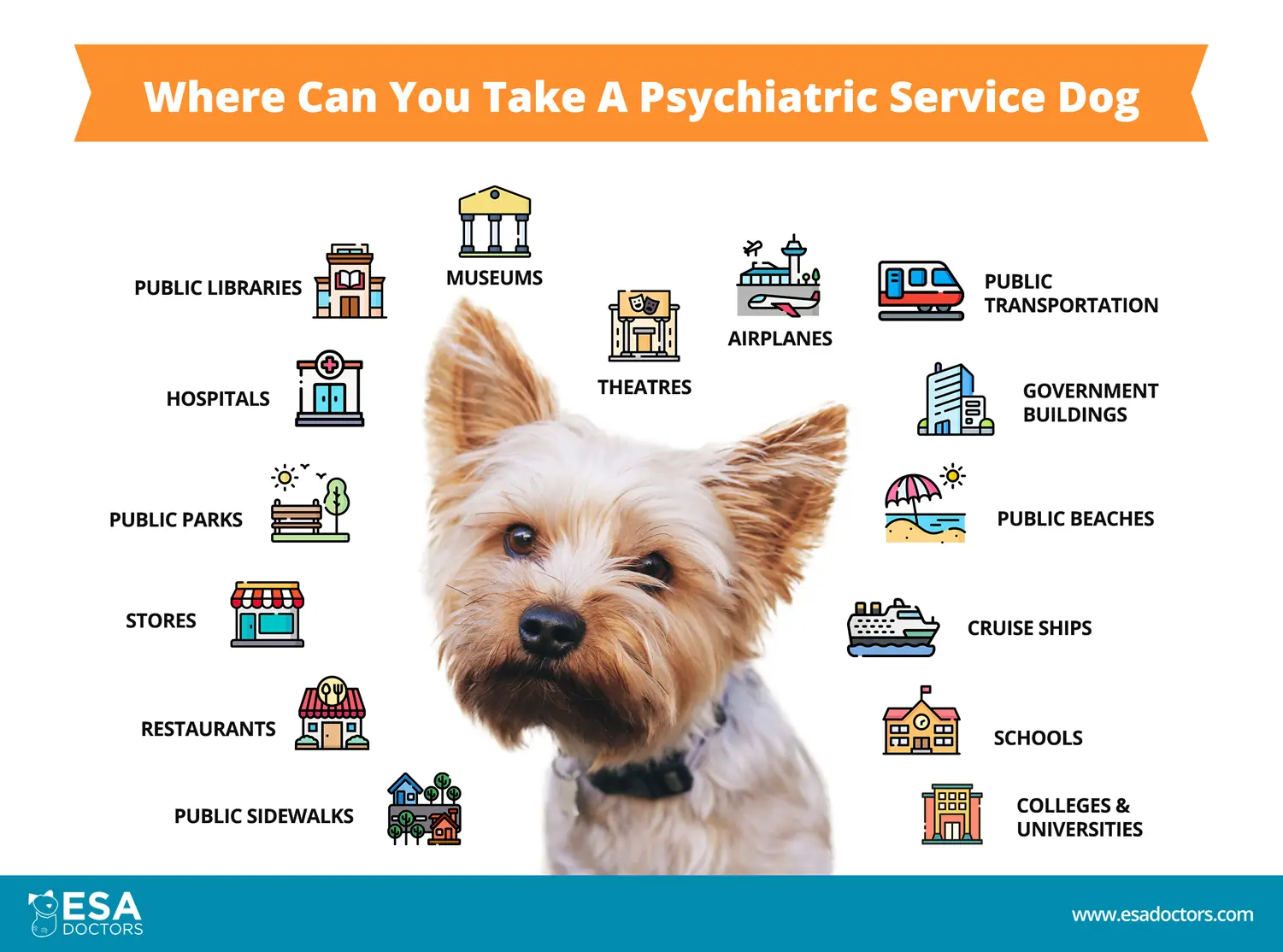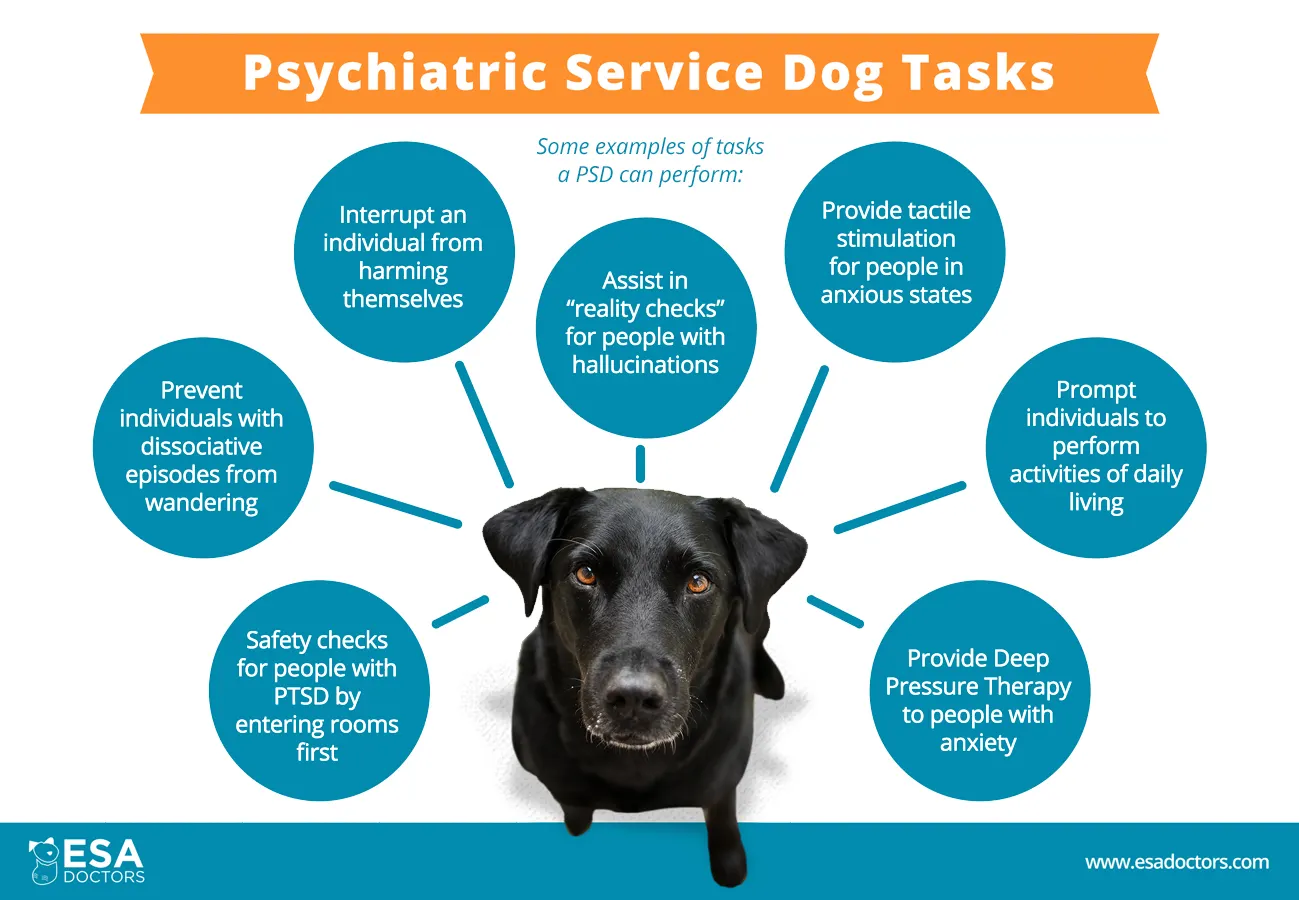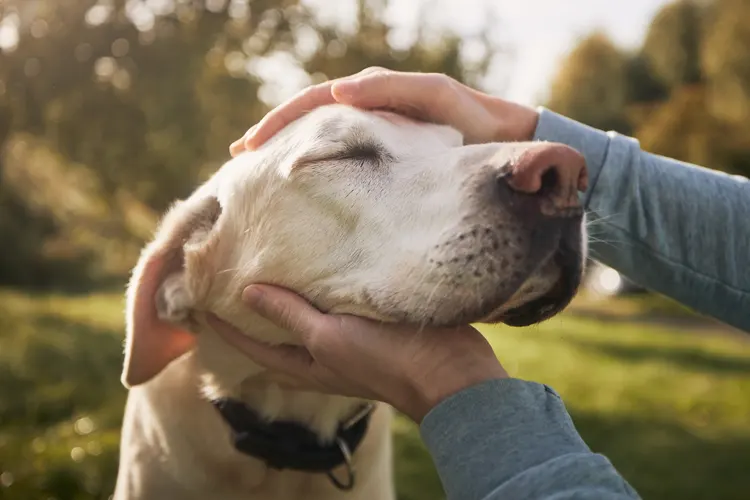A Psychiatric Service Dog (PSD) is a type of assistance dog that helps people manage mental health conditions by performing trained tasks. PSDs have full public access rights under federal and state laws, including entry to restaurants, stores, housing, and airplanes.
After reading this guide, you will understand who qualifies for a PSD, what tasks these dogs perform for mental health support, how to get and train a PSD, and the legal rights and protections you have as a handler.
Table of contents
What exactly is a psychiatric service dog?
A Psychiatric Service Dog is a service animal trained to support your mental health. Just like service dogs trained for physical disabilities, PSDs are protected by laws that ensure their acceptance in society. PSDs are different from emotional support animals (ESAs) because they are needed to perform a task for their handler. ESAs require no training and provide support just by hanging around.
By law, Psychiatric Service Dogs are permitted in public areas where ordinary pets are disallowed. You can also bring a PSD on flights with no extra charge. You may need to complete a DOT Service Animal Air Transportation Form to do so.
To be eligible for a PSD, a person must have a mental health condition like anxiety, depression, PTSD, ADHD, or obsessive-compulsive disorder that significantly impacts major life activities like the ability to work, socialize, study, or sleep. Not sure if you qualify? Ask for a PSD letter from your licensed mental health professional, which is a signed document containing their opinion on whether you have an ADA mental health disability.
If you are interested in a Psychiatric Service Dog Letter, we can connect you with a licensed healthcare provider.
PSD Training Requirements
A PSD must learn specific tasks that help you manage your mental health condition. For example, a PSD might:
- Wake you during nightmares
- Guide you to exits during panic attacks
- Alert you to take medication
- Create personal space in crowded areas
- Interrupt self-harming behaviors
- Apply deep pressure therapy
Beyond these tasks, your PSD needs solid public access training. This means staying calm and focused on you in challenging environments like:
- Busy restaurants
- Crowded stores
- Public transit
- Medical appointments
- Movie theaters
You can train your PSD yourself or work with a professional trainer — both are legal under the ADA. Self-training works well if you have experience with dog training and understand the tasks you need. However, many handlers find professional training helpful, especially for complex tasks or public access work. Training a PSD is non-negotiable. If your dog is untrained but provides mental health support through companionship, you can try getting an ESA letter to legally designate your pet as an emotional support animal.
Check out our list of over 150 service dog tasks to get more ideas about what a psychiatric service dog can do.

Psychiatric Service Dog Tasks
What can a Psychiatric Service Dog be trained to do? A better question might be, what can’t they do! PSDs can perform an amazing variety of tasks for their handlers.
These are just a few examples of the specific tasks that these highly trained dogs can perform, which makes them indispensable to their handlers:
Anxiety Disorders:
- Anxiety and Panic Attack Alert: PSDs can detect early signs of anxiety or panic attacks before their handler is aware of them. They do this by recognizing changes in their handler’s breathing, heart rate, body chemistry, and behavior (like pacing or trembling). They can then respond with trained tasks such as deep pressure therapy or leading them to a quiet space.
- Grounding Techniques: In moments of heightened anxiety, PSDs can perform grounding techniques, such as deep pressure therapy, to help alleviate anxiety symptoms.
Depression:
- Medication Reminders: A PSD can be trained to respond to specific times of day (often paired with an alarm or routine) or to recognize physical signs of missed medication, such as changes in their handler’s behavior, mood, or movement patterns.
- Activity Motivation: A PSD can encourage a handler dealing with depression to engage in physical activity or daily routines, which can be challenging when experiencing depressive symptoms.
Post-Traumatic Stress Disorder (PTSD):
- Nightmare Interruption: PSDs can be trained to wake their handler during a nightmare, providing immediate comfort.
- Flashback Interruption: During a PTSD flashback, a PSD can provide physical contact like licking or deep pressure therapy to help ground their handler back in the present.
Obsessive-Compulsive Disorder (OCD):
- Interruption of Compulsive Behaviors: A PSD can be trained to interrupt repetitive behaviors like excessive hand-washing or checking locks by physically interrupting the action and redirecting their handler’s attention, helping to break the OCD cycle before it escalates.
Dissociative Disorders:
- Dissociative Episode Assistance: A PSD helps with dissociation by recognizing early signs like a blank stare or lack of response and performing grounding tasks such as pawing, licking, or pressing against their handler to help maintain connection with the present moment.

Legal Rights of Psychiatric Service Dogs
Psychiatric Service Dogs have extensive legal protections under U.S. federal law. Under the ADA, Fair Housing Act, and Air Carrier Access Act, you can take a psychiatric service dog to places that normally don’t allow dogs.
Your PSD can accompany you in places like:
- Restaurants and grocery stores
- Hotels and vacation rentals
- Beaches and parks
- Public transportation
- Airplanes and airports
Psychiatric service dogs also have housing rights. Most landlords are obligated to do the following:
- Accept your PSD regardless of “no pets” policies
- Waive all pet fees and deposits
- Allow PSDs of any breed or size
- Make reasonable accommodations for your service dog
Businesses, public venues, and landlords that violate these service dog rights can face legal consequences and fines not only under federal law.
Flying with a Psychiatric Service Dog
Air travel regulations grant PSDs the right to board planes with their handler without any additional charges. To enjoy this benefit, PSD handlers just need to submit the DOT’s Service Animal Air Transportation Form to the airline ahead of time.
Airlines will welcome your service dog onboard as long as you submit the DOT Form. We also recommend having other service dog accessories, such as a harness, vests, tag, and PSD letter, while you’re at the airport, so staff and other passengers can easily recognize that you have a service dog and not a normal pet. Normal pets are subject to heavy restrictions and fees, so it’s important for staff to be fully aware that you’re traveling with a PSD.
How to Validate a Psychiatric Service Dog
If you are in a public place or an establishment and someone wants to verify that you have a psychiatric service dog, they are legally allowed to ask only two questions:
- Is the dog a psychiatric service dog required because of a disability?
- What work or task has the PSD been trained to perform?
The law does not permit inquiring about the specifics of the handler’s disability, demanding to see the PSD perform its task, or asking for identification or certification as proof of the service dog. As a psychiatric service dog owner, you have a right to privacy and dignity. Third parties have to limit themselves to the two questions above and can’t interrogate you about your health status.

See if you qualify for a psychiatric service dog.
Complete the Psychiatric Service Dog Questionnaire now!
Get your Psychiatric Service Dog Letter Now





How do I get a psd certificate for my doctor to validate for me? I can’t afford $200.00 when my own doctor knows me best and can fill it out for free.
You don’t need a certificate for a psychiatric service dog. You can ask for a PSD letter if that’s what you meant. A doctor or therapist can provide one for you.